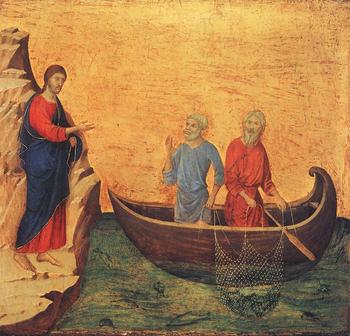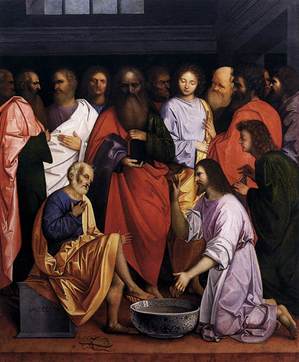I've been reading some of the issues of America Magazine, a Jesuit weekly. Frankly, it is a chore to do so. The Jesuits are often too snarky without reason and not all that insightful for my taste. Of course, today I found a rather good article to think about (see the following) regarding the devotion to the Sacred Heart of Jesus. It was a surprise. Something so "quaint" as the Sacred Heart is rather surprising the pages of America these days even knowing that the precursor to America is The Messenger of the Sacred Heart. (Jesuit Father John J. Wynne changed the name in 1909 to make the magazine more "intelligent.") Don't get me wrong: I don't think the devotion to the Sacred Heart is old-fashioned at all. As the author points out, the Lord communicated His desires to Sister -later Saint--Margaret Mary to make this act of reverence known. It is, therefore, a request of the Lord Himself to spend time in loving adoration of Him. Hence, I think it ought to be promoted regularly and with sensitivity to beauty. There is great respectability in the adoration of the Sacred Heart which needs to be recovered in our daily living.
Heart of the Matter
Rediscovering a time-honored devotion
By David M. Knight
America Magazine
November 10, 2008
There was a time when devotion to the Sacred Heart needed no introduction. Not any more. Many people today have never even heard of it. Should we try to revive it or let it die?
Before answering that question, let us recall that at least two popes have written encyclicals presenting this devotion as "no ordinary form of piety" but rather "a summary of all our religion." These are strong words. Four popes have been calling for a "new evangelization." What better time to launch a revival of the devotion to the Sacred Heart than during the Year of Paul, which began on June 29, 2008?
The devotion to the Sacred Heart as we know it today began with a vision of Christ given to St. Margaret Mary Alacoque in 1673 at Paray-le-Monial, France. In that vision the heart of Jesus was visible, on fire with love, pierced by a lance and thorns. Christ's words were, "See the heart that has loved so much and receives so little in return." Christ's desire was to focus people's attention on his love. He asked that individuals and families display a picture of his Sacred Heart in their home.
The devotion encouraged people to begin each day with a morning offering, to consecrate themselves to the Sacred Heart and dedicate themselves to making reparation through prayers and penance for the failure of people to respond to Christ's love. Devotion to the Sacred Heart encouraged frequent Com-munion and adoration of Jesus in the Blessed Sacrament, especially during a holy hour before the first Friday of every month, in order to promote "a truly grateful love for Jesus."
How might each of these elements be practiced today in ways consonant with the progress Catholic spirituality has made since the 17th century?
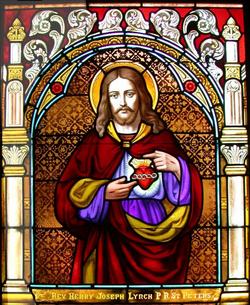 The Image
The Image
Focusing on the image of the Sacred Heart should recall us to a deeply personal relationship with Jesus Christ as the very center of our spirituality. We need to live and experience our religion, not as a system of laws and practices, but as a spirituality of exciting, personal and even passionate interaction of love and friendship with Jesus. Christianity is a religion of love aroused by an awareness of God's love for us first. In St. Paul's words, it is the "love of Christ" that "urges us on."
Consecration
The act of consecration fundamental to Christian life is baptism. We need to deepen our understanding of the commitments inherent in the sacrament that made us Christians, until we all say with St. Paul, "I live now, not I, but Christ lives in me" (Gal 2:20). This is the mystery of our identity as Christians. The image of the Sacred Heart reflects the promise of the Christian identity bestowed by baptism. Contemplating that image should lead us to live as the saving Christ, fired by his love. This means inviting Jesus constantly to act with us, in us and through us to "save" and lift up all of our activities and engagements--at home, at work, in our social and civic life.
Our act of consecration and morning offering are combined in the ongoing affirmation of our baptismal promises: "Lord, I give you my body. Live this day with me, live this day in me, live this day through me." We extend this by repeating the WIT prayer before everything we do: "Lord, do this with me; do this in me; do this through me."
Reparation
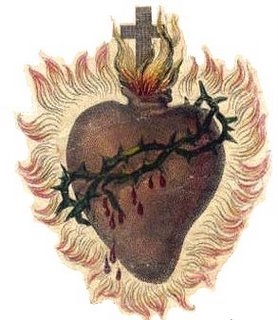 Reparation to the Sacred Heart is realized in the prayers and penances we offer to Jesus to make up for the failure of people to respond to his love. For ordinary Christians leading busy lives in the world, the most practical form reparation can take is repair work. We need to respond effectively to the landslide loss of faith among those around us, to the distressing defection of Catholics who no longer attend Mass and to the uncritical acceptance of the distorted values of our contemporary culture, including the relativism that Benedict XVI has called the "greatest threat to faith in our day." We need to recognize and resist the implicit idolatry of so many for whom religion is just a part, and not even the most important part, of their life. Our resistance should be fundamental and radical.
Reparation to the Sacred Heart is realized in the prayers and penances we offer to Jesus to make up for the failure of people to respond to his love. For ordinary Christians leading busy lives in the world, the most practical form reparation can take is repair work. We need to respond effectively to the landslide loss of faith among those around us, to the distressing defection of Catholics who no longer attend Mass and to the uncritical acceptance of the distorted values of our contemporary culture, including the relativism that Benedict XVI has called the "greatest threat to faith in our day." We need to recognize and resist the implicit idolatry of so many for whom religion is just a part, and not even the most important part, of their life. Our resistance should be fundamental and radical.
Baptism commits us to such a response. The minister's words as he anointed us with chrism were, "As Christ was anointed priest, prophet and king, so live always as a member of his body." This is our job description as Christians: to bear witness as prophets, to minister to everyone with love as priests by baptism, and to take responsibility for the transformation of society as stewards of Christ's kingship. This is radical reparation.
As prophets we can repair the damage sin has done and is doing to the world by bearing witness to the Gospel through a lifestyle that wins people to faith. If we contemplate the contrast between Christ's passionate love and the lukewarm response given to it by most believers, the image of Christ's heart will motivate us to live a lifestyle radically different from the conventional expectations of our society.
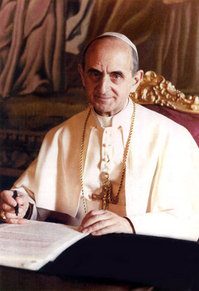 Pope Paul VI defined witnesses as those who "radiate faith in values that go beyond current values, and hope in something not seen, that one would not dare to imagine. Through this wordless witness, they stir up irresistible questions in the hearts of those who see how they live: Why are they like this? Why do they live in this way?" Witnesses are those whose lifestyle raises eyebrows.
Pope Paul VI defined witnesses as those who "radiate faith in values that go beyond current values, and hope in something not seen, that one would not dare to imagine. Through this wordless witness, they stir up irresistible questions in the hearts of those who see how they live: Why are they like this? Why do they live in this way?" Witnesses are those whose lifestyle raises eyebrows.
To commit oneself to a life of witness is to change one's whole standard of morality. We would never ask again just whether something is right or wrong, but whether it bears witness to the values of the Gospel. This is reparation that echoes the teaching of Paul: "If with Christ you died [in baptism]... why do you live as if you still belonged to the world?.... Live your life in a manner worthy of the Gospel of Christ" (Col 2:20).
As priests by baptism we say in our hearts to every person we encounter, "This is my body, given for you; my flesh for the life of the world." The contemplation of Christ's heart, wounded by the denial of love, leads us to recognize those same wounds now borne by others; it motivates us to make reparation through the healing ministry of love.
It is not just the heart of Christ that is wounded by the absence of love in the world; all of us are. People sin because they are not loved. People sin seeking love. People live mediocre lives because they feel they are only moderately loved. People do not respond to God with passion because they do not believe God loves them with passion. And they do not believe this because they do not experience the passionate love of Jesus reaching out to them in the visible members of his body.
The problem with the world is that the church does not love enough. The heart of Christ is not a vivid presence in today's world, because it is not sufficiently visible in his body on earth. The Sacred Heart needs to be seen as a living heart, full of love for living people.
When we "presented our bodies" at baptism "as a living sacrifice to God," we pledged that we would be "sacrificed" to continue the mission of Jesus, both priest and victim. As Christians, we never deal with anyone on a purely professional or impersonal level, ignoring their humanity. Paul saw ministry as the mystery of bringing Christ to birth and to full stature in every member of the human race. Our ministry of reparation must "build up the body of Christ" in love.
As stewards of Christ's kingship we repair what sin has done to the world. We address the social structures, policies and practices that produce environments that breed destruction and deceit.
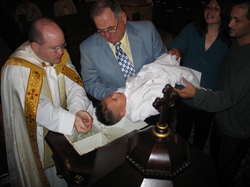 Our baptismal anointing as sharers in Christ's kingship makes us responsible for extending the reign of his love over every area and activity of human life on earth. This commits us to leadership, to taking the initiative in promoting the changes we perceive as desirable in family, church, business, politics, social life and neighborhood. If we love Jesus Christ and understand his love for the world, we cannot remain indifferent or passive in the face of false principles and destructive policies that block the "peace and unity of his kingdom."
Our baptismal anointing as sharers in Christ's kingship makes us responsible for extending the reign of his love over every area and activity of human life on earth. This commits us to leadership, to taking the initiative in promoting the changes we perceive as desirable in family, church, business, politics, social life and neighborhood. If we love Jesus Christ and understand his love for the world, we cannot remain indifferent or passive in the face of false principles and destructive policies that block the "peace and unity of his kingdom."
Jesus said that in devotion to his heart people will find "all the sanctifying and saving graces needed to draw them back from the abyss of destruction." John Dear, S.J., has identified this abyss in "The Politics of the Sacred Heart," (National Catholic Reporter Conversation Café (http://ncrcafe.org), 6/19/07):
Today we stand at the brink of unprecedented global destruction, global warming and global violence. This violence pushes us personally and internationally ever closer to the abyss of destruction, but the grace of the Sacred Heart--with all its burning social, economic and political implications--has the power to convert us into people of Gospel nonviolence, pull us back from the brink, and create a new world of peace with justice.... If we were to adopt the image of the Sacred Heart as our image of a nonviolent, peacemaking God, and live not just individually but communally, nationally and globally according to that nonviolent, radiant love, the world would be disarmed.
If we love Jesus Christ and share his love for the world, we will "make reparation" for the sins of the world by working against anything that delays what Paul described as God's "plan for the fullness of time," which is to "gather up all things in Christ, things in heaven and things on earth" so that Christ might be "all in all."
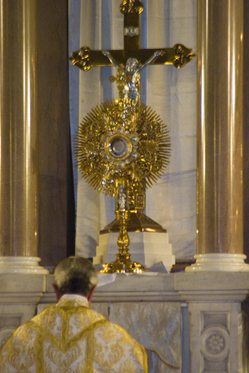 Adoration
Adoration
Adoration has always been part of devotion to the Sacred Heart, especially before the Blessed Sacrament. But adoration, in its pure form, is just wordless absorption in the awesome reality of God. In the act of adoring we do not do anything else. But most people cannot sustain this for more than a few minutes at a time. So instead of adoration we pray the Rosary, read Scripture or other books, or say other familiar vocal prayers. These are all good things to do, but they are not what the church understands by adoration.
Before we can practice adoration, we need to know the heart we are to adore. So when we invite others to adoration of the Blessed Sacrament, we should teach them to prepare themselves for it by learning the mind and heart of Christ. We enter Christ's heart by letting his words abide in us: by reading and reflecting on Scripture and by making the connection constantly between what we learn and what we live.
True devotion to the Sacred Heart is not simply the repetition of certain acts; it is a profound change in consciousness that we acquire as a result of that repetition. St. Paul exhorts us, "Let the same mind be in you that was in Christ Jesus" (Phil 2:5). This is a call to discipleship: a lifelong commitment to studying the mind and heart of Christ.
Why revive devotion to the Sacred Heart?
Devotion to the Sacred Heart is not a particular devotion that needs to be revived. Rather, it is the fundamental center of all Catholic spirituality that needs to be revitalized by a "new evangelization." If we revive devotion to the Sacred Heart in its authentic identity, we will have revived Christianity in the church. This would be a great way to celebrate the Year of Paul.
Rev. David M. Knight, a priest of the Memphis diocese and the author of more than 20 books, has taught at The Catholic University of America and at Loyola University in New Orleans.
